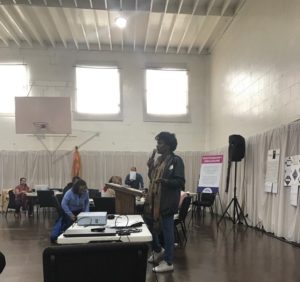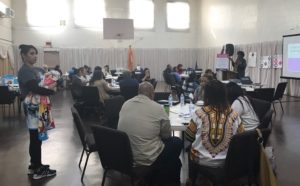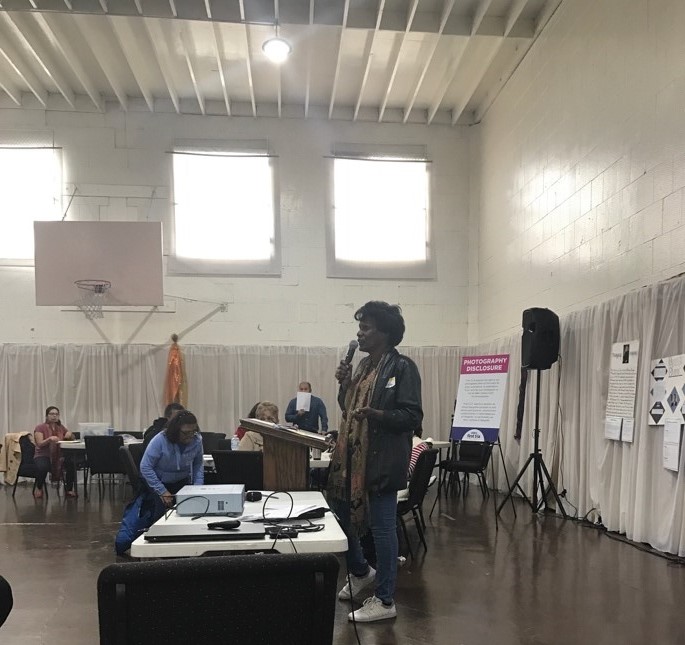Best Start is First 5 LA’s place-based initiative designed to improved results for children, families and communities. The initiative, which operates in 14 of Los Angeles’ most challenged communities, supports the development of local Community Partnerships made up of parents, residents, business and community leaders, health care providers, community service agencies, faith-based leaders, local government officials and interested community members who have made a commitment to working together to improve the conditions and opportunities that will ultimately improve results for children, families and the communities they live in. CSSP’s primary role with First 5 LA and the Best Start initiative is to help build the capacity of the 14 Community Partnerships so that they are high functioning, results focused entities that will continuously seek to improve community and family conditions for children for years to come.
With a team of approximately 20 members, the Los Angeles based CSSP team works directly with community partnership members, local organization and building organizations to ensure that the essential capacity building measures that have been the core of CSSP’s work overtime are the basis for each partnerships’ skill building and design.
To many seeking team or organizational performance improvements, Bruce Tuckman’s model of forming, storming, norming, performing (and adjourning) is a familiar and catchy reminder to understanding how teams and organizations develop. Or perhaps Susan Kenny Stevens’ lifecycles of nonprofit organization’s model is a helpful tool. In these examples, there is one constant: the human interactions that move groups in and out of these stages. Yet human interactions are not always smooth and are sometimes fraught with conflict. So no matter the developmental stage, how do we help individuals and teams handle conflict effectively?
CSSP’s Partnership Support Team (PST), the group tasked with building the capacity of 14 place-based sites in Los Angeles working to improve outcome for children and families through First 5 LA’s Best Start Initiative, is also asking this question. To go by Tuckman’s model, many of the 14 sites have formed and stormed. As communities norm and perform, a key, mutual component of their work is local leadership development. Local leaders are transforming communities, building stronger families and more resilient communities that can provide pathways to ensure that children prenatal to five are healthy, safe and ready to learn by kindergarten. But the path to these outcomes can be tricky, especially as community leaders navigate personal visions and expectations that compete against community plans and desires to achieve agreed-upon outcomes.
Bertha L., one community leader in Best Start Compton identified the leadership group’s ability to deal with conflict in the following way before PST’s capacity building support, “We resolved conflict by inertia.…We had no techniques to deal with conflict.” Another leader, Patricia C., mentioned, “I don’t think it [conflict] was held personal. We had disagreements but it would be like, okay, let’s move on to the next thing.”
When asked to assess the various conflicts that exist as local leadership groups develop, PST Capacity Builders identified organizational and interpersonal conflict as two issues that Best Start communities need to resolve most frequently. Though Capacity Builders assisted communities to solve both, settling interpersonal conflicts – such as competition among dominant personalities, disagreements about resources and who decides them and personal mistrust among leadership members – generally proves to be the most challenging. Yet when breakthroughs occur in interpersonal conflict, conflicts with external partners seem to be more easily resolved.
Within the Best Start Communities, PST Capacity Builders used a variety of conflict resolution approaches, such as training groups in traditional conflict resolution methods, implementing restorative justice models to minimize group divergence and developing clear codes of conduct to ensure better group behavior. One community, Best Start Compton, is looking at a more nontraditional approach – mindfulness training – to achieve greater interpersonal understanding through training and continued practice.
Mindfulness refers to a person’s ability to focus attention on the situation at hand, to observe the judgments he or she makes at any given moment and to choose how to respond appropriately. Kara Coleman, PST member and Compton Best Start Capacity Builder, noted that mindfulness training is focused on learning about and practicing techniques that can help improve leadership skills. Kara described a mindful leader as, “…someone who brings out the best in oneself and others by consistently ‘showing up’ present, grounded and compassionate, especially in challenging situations.” In mindfulness training, community members were grounded in its main ideas and given tools to quiet the mind and prepare for difficult conversations. These tools are critical to being present and engaged and to know how to handle conflict when it occurs or even circumvent it.
 When asked what they learned that helped them to grow as leaders and handle interpersonal and group conflict better, two representative Compton leaders, Bertha L. and Patricia C., answered that question in the following ways:
When asked what they learned that helped them to grow as leaders and handle interpersonal and group conflict better, two representative Compton leaders, Bertha L. and Patricia C., answered that question in the following ways:
Berta L. said, “For me personally, the points I learned are that I need to listen to the other person to be able to understand the problem. After that, I need to dialogue to understand what is really bothering him/her and then to understand my personal point of view, before arriving at an agreement.”
Patricia C. added, “I agree. A lot of times we need to put ourselves in the other person’s place if at all possible. And try to understand where they are coming from. A lot of time we don’t know what they’ve encountered. This might not be the issue, it could be something external, external to our group.…The training helped me to understand where the person is coming from, their perspective.”
Yet community leaders also noted the ability to use mindfulness techniques in their lives outside of Best Start. Bertha L. noted, “Not only can we use this [mindfulness] here, but also in other aspects of our lives because we have children, we have friends, we have other relationships and there will always be conflict. And there will also be people with whom we agree with for X or Y reason. Nobody thinks the same. We are all individuals and we are all different. You [Kara] put a lot of emphasis that we are all individuals and that we all react in ways that is not equal to the others and we do not always agree with our environment.”
When asked how conflict is handled differently or what is different as a result of using this mindfulness approach, Kara characterized Best Start Compton’s interactions in the following way to some of its leaders: “In the past it [conflict] could be overly aggressive… what I’ve noticed is that I see and hear you [leadership members] being thoughtful in terms of what you’re seeing if things hit you or rub you the wrong way.
Silvia Elkins another PST member and Capacity Builder in Compton observed, “I feel they [leadership members] have become more resilient. Able to take a little bit more. But now they know what to do with it, how to really diffuse the situation and how to work the positive and put the negative on the side.”
 People are much more willing to take a moment before they speak or check-in.” Kara also mentioned that she sees “an increased confidence in being able to work out things between each other…in the past, when people would argue, people would get quiet and they held more in because it was hard to know if it was okay to express concerns and express yourself. But I see more comfort…There’s always going to be moments of disagreement or hearing something wrong or miscommunication, but you don’t get stuck there and you don’t carry it [forward.]”
People are much more willing to take a moment before they speak or check-in.” Kara also mentioned that she sees “an increased confidence in being able to work out things between each other…in the past, when people would argue, people would get quiet and they held more in because it was hard to know if it was okay to express concerns and express yourself. But I see more comfort…There’s always going to be moments of disagreement or hearing something wrong or miscommunication, but you don’t get stuck there and you don’t carry it [forward.]”
When asked, what advice they would give other Best Start leaders about bringing their best selves to meetings and difficult conversations, Patricia C. remarked, “I would say, come in with an open mind. Don’t take it personal. There’s no such thing as a dumb question; we are all here learning. No one has got it all down perfectly. So with that in mind, it is a learning environment, just [learn how to] screen from what you hear if there is a disagreement, do not to take it personally. Don’t hold on to it. … Personally, I don’t like dealing with conflict, but I will if I have to, but I don’t enjoy it. But I think we can always come to a peaceful resolution and need to emphasize that.”
—
José Montaño is a Capacity Builder for the CSSP Partnership Support Team.
